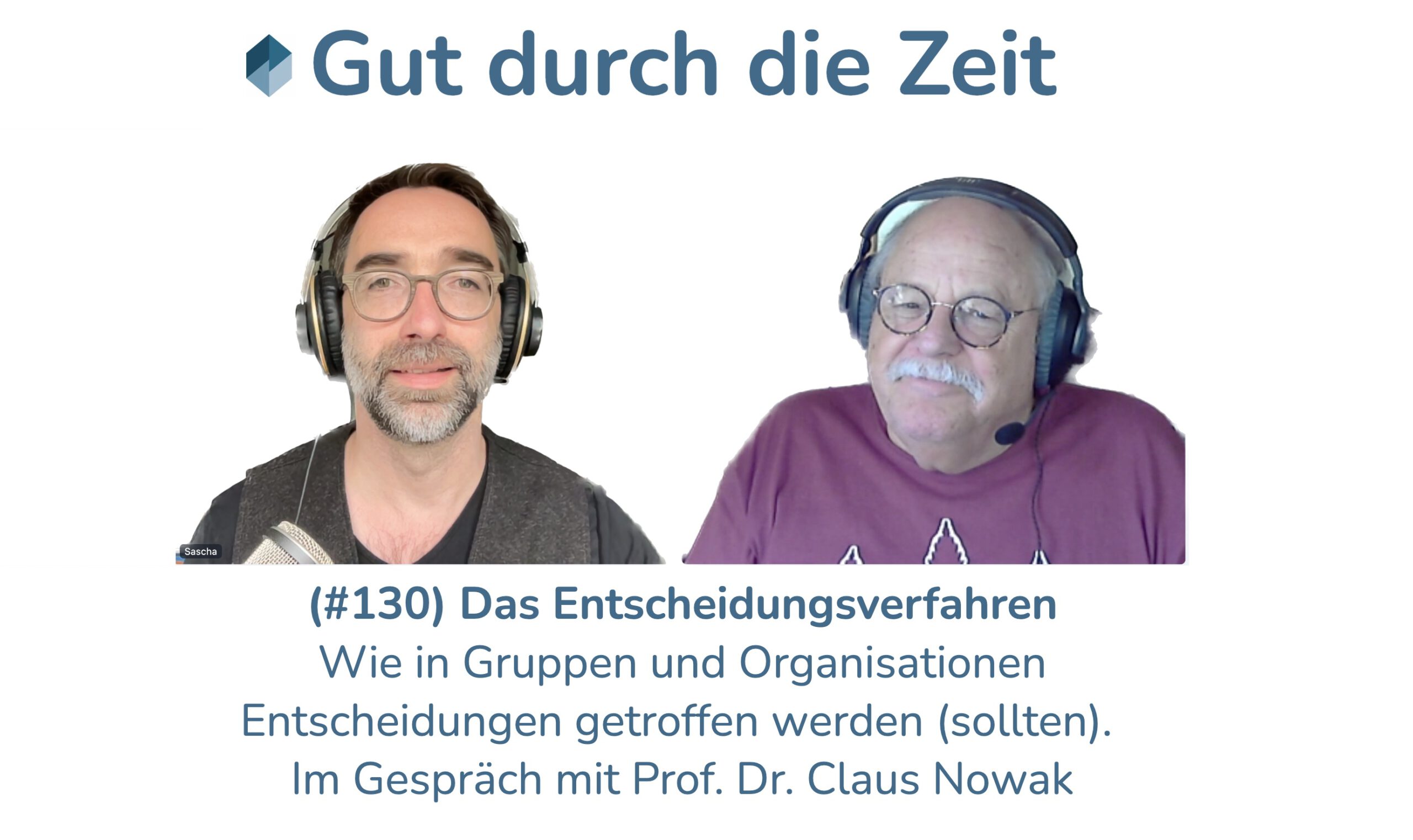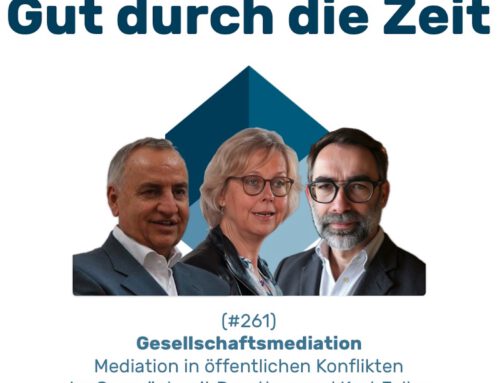INKOVEMA Podcast „Well through time“
#130 – The decision-making process
How decisions are (or should be) made in groups and organisations. In conversation with Prof Dr Claus Nowak
Well through time. The podcast about mediation, conflict coaching and organisational consulting.
Prof Dr Claus Nowak, Coach, consultant, author of specialist books, honorary professor for personnel and organisational development at the University of Hamburg; doctorate in marine biology and trained secondary school teacher.
Contents:
When several people are involved in a decision, suspicions, problems and conflicts regularly arise if the decision-making process and therefore the way in which the decision was reached is unclear. It is particularly problematic that the procedure itself is regularly only discussed in these cases where mistrust has already arisen. The concept of the decision-making process developed by Claus Nowak is intended to help solve these problems:
1. legitimacy of decisions through power – and the question of who legitimises power through hierarchy (as a principle of order).
In this podcast interview, Professors Sascha Weigel and Claus Nowak discuss the legitimacy of decisions in an organisation and how abuse of power by omission can occur. They emphasise that hierarchies in organisations serve to legitimise decisions, especially those that resolve conflicts that cannot be resolved by the team members themselves. Managers have a responsibility to make decisions and facilitate the conflict resolution process. However, when leaders ignore or deny this responsibility, they are committing an abuse of power by omission.
Few things lead to more conflicts in organisations than non-transparent decision-making processes.
2. decision-making procedure and conflicts about the procedure
The conversation focuses on the Importance of clear communication about the decision-making process. It must be transparent for everyone that there is an information and consultation phase and what significance this information and consultation has for the decision-making process.
Few things lead to more conflict than non-transparent decision-making processes. People often only discuss the decision-making process when they are already involved in a controversial discussion. In such situations, the procedure itself becomes a point of contention. It is advisable to make clear agreements from the outset about where and how decisions are made and by whom in order to avoid misunderstandings and conflicts.
3. difference between democracy and participation
The participants emphasise the difference between democracy and participation. Democracy refers to a bottom-up process, while participation is a top-down process. Before a decision is made, all participants should agree on how much participation is desired and appropriate. This enables clear communication and prevents potential conflicts over the level of participation.
Participation leads from the top to the bottom, while democracy leads from the bottom to the top. And in both cases, the degree of democracy or participation must be defined or accepted by both sides in agreement.
4. information, counselling, decision
In a decision-making process, it is often helpful to distinguish between the information and consultation phase and the decision-making phase. In the information and consultation phase, information is collected, options are weighed up and various opinions and expertise are obtained (in an advisory capacity). This provides a sound basis for decision-making. In the decision phase, on the other hand, the collected information and recommendations are analysed, priorities are set and a final decision is made.
The distinction between these phases is important to ensure that different points of view and information are taken into account appropriately. It also enables a clear separation of the responsibilities and roles of those involved.
In some cases, the same people can both gather and advise on the information and make the final decision. A works council committee could be mentioned here as an example. This can, of course, lead to conflicts of interest. A conflict of interest occurs when a person is in a situation where their personal interests or obligations clash with their professional responsibilities or the objective assessment of the information. Conflicts of interest can impair decision-making, as the person concerned may not act impartially and objectively. It is possible that personal preferences, prejudices or financial interests (should) influence the decision. Information can be withheld, analysed too early and eliminated. Or the advice may be one-sided.
However, the fact that people both inform and decide can also have advantages. It enables a more direct integration of information and opinions into the decision-making process. This allows relevant insights and different perspectives to be considered earlier, which can lead to a more comprehensive and informed decision.
It is important that transparency, openness and professional standards are maintained in such situations in order to minimise potential conflicts of interest. This can be achieved by establishing clear behavioural guidelines, ethical standards and review mechanisms. Counsellors should be aware that they may be acting in a dual role and ensure that they carry out their duties with integrity and objective judgement.
To summarise, distinguishing between the consultation phase and the decision-making phase and paying attention to potential conflicts of interest among people who both inform and decide are important aspects of an effective decision-making process. By taking these points into account, the quality of decisions can be improved and potential conflicts minimised.
5. delegation of responsibility
Another important point is the delegation of responsibility. Managers can delegate responsibility to their team members, but there are certain areas such as budget, personnel and strategy that are difficult to delegate. It is emphasised that participation is possible, but ultimately the manager is responsible for the decision made. This emphasises the balance between participation and ultimate responsibility.
These five points, summarised from the podcast conversation, emphasise the importance of legitimate decisions that prevent abuse of power by omission, the need for clear communication about decision-making processes and discussions, the difference between democracy and participation, and the delegation of responsibility in an organisation.






Leave A Comment